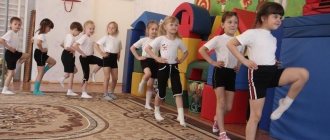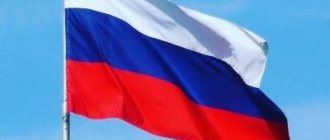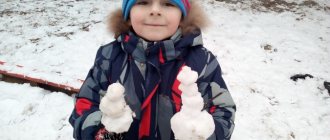Calendar and thematic planning “My Motherland - Russia”
PLANNING EDUCATIONAL WORK (per day)
Group Preparatory "B" Theme "Russia - My Motherland"
Target:
Formation in children of knowledge about their homeland, patriotic feelings, pride and love for Russia.
Final event: Matinee “Russia Day”.
the date of the
final event: 06/01/2019. time 10.30
Responsible for the final event
| Day of the week | Mode | Joint activities of adults and children, taking into account the integration of educational areas | Organization of a developmental environment for children’s independent activities (activity centers, all group rooms) | ||||
| Group, subgroup | Individual | Educational activities in special moments | |||||
| 1 | 2 | 3 | 4 | 5 | 6 | ||
| June 11 - Monday | Morning | Morning exercises No. 2 Hearing “Songs about the Motherland” by I. Dunaevsky Conversation “We live in Russia”, “My city is my small Motherland”. Game “Interview”: “What does the word citizen ?. Expand your understanding of your citizenship. Didactic game "Young Traveler" Goal: To expand children's knowledge about the geography of Russia. Enter into the active dictionary the names of cities, rivers, lakes and seas located on the territory of Russia. | Ind. slave. on ecology with under. children - fix the names of animals from their native land - Milana, Dima, Ksyusha, Denis. | Canteen duty table setting (independently under the supervision of an adult); | In the creative center offer coloring pages “Now birch, now rowan.” To help consolidate the names of trees and shrubs in Russia. Encourage the ability to paint carefully, choosing the right color scheme. Add to albums for viewing “My Russia”. | ||
| Organized educational activities | Presentation: "Motherland". I love you, Russia - to cultivate love for your native Fatherland, a sense of pride for your country Russia, to introduce you to the Russian coat of arms, flag, anthem; develop interest in the historical past. Physical Culture: according to the physical plan Instructor. | ||||||
| Walk | Observation at work as a janitor. Goals: to intensify cognitive activity; Develop the ability to see the expediency of work actions; learn to evaluate the results of work. Reading a poem about the homeland of M. Plyatskovsky - to show how poets glorify the Motherland. Round dance game "Carousel" - teach children to move in a circle at different paces, to coordinate movements with each other. Desktop-printed games at the request of the children. | Sports game elements basketball. Goal: Continue to introduce children to the rules of the game. Remind the rules of safe behavior with the ball, the technique of moving around the playground, and practice various actions with the ball. Egor, Ilya, Mekhrona, Dasha, Ksyusha K. | Memorization sayings and proverbs: “The Motherland is more beautiful than the sun, more valuable than gold,” “A man has one mother, and he has one Motherland.” Situational conversation and speech situation: “If you are lost on the street?” Goal: to teach how to behave correctly if you are lost on the street and who to turn to for help in this situation, to anticipate the possible consequences of your actions. | S/R game "City streets" Goal: To foster friendly feelings; establish rules of behavior on the street near the roadway. Invite children to choose suitable transport for themselves for a visit, activate the words “driver”, “chauffeur”, “trip”, “passengers” in children’s speech | |||
| Work before bed | Reading fiction. K. Ushinsky “Our Fatherland” | ||||||
| Evening | Wellness activities after sleep: awakening gymnastics, walking along massage paths. Creative play “Travel around Russia.” Expand the plot by showing in the game the social relations of labor among workers in transport, catering, and tourism. Develop imagination and the ability to convey game actions according to the accepted role. | Learning poems about Moscow. A.L. Barto “I live in Moscow” and N. Zabila “Our Motherland” To evoke in children an emotional response to the work, interest in it, to teach them to identify genre features, to distinguish them from works of other genres. Nastya, Alya, Lisa S., Lisa T. | Household work : invite the girls to wipe the dust on the shelves in the play corner. Goal: To foster hard work and order in the group. | In the book corner create conditions for children to look at books and illustrations “My Motherland is Russia.” To the development center add push-button mosaics. Suggest that it be modeled after a bear, a symbol of Russia. Listening to songs about Moscow: “My Moscow” by M. Lisyansky, S. Agranyan, “Moscow” by F. Glinka Goal: to cultivate patriotic feelings and emotional response in children | |||
| Walk. | 1. Target walk around the kindergarten building. Note changes in nature. 2. Russian folk games “Paints”, “Chains are forged” 3. Labor activity . 4. And individual work with Alena, Sofia, Igor - 5 . | ||||||
PLANNING EDUCATIONAL WORK (per day)
Group Preparatory "B" Theme "Russia - My Motherland"
Target:
Formation in children of knowledge about their homeland, patriotic feelings, pride and love for Russia.
Final event: Matinee “Russia Day”.
the date of the
final event: 06/01/2019. time 10.30
Responsible for the final event
| Day of the week | Mode | Joint activities of adults and children, taking into account the integration of educational areas | Organization of a developmental environment for children’s independent activities (activity centers, all group rooms) | ||
| Group, subgroup | Individual | Educational activities in special moments | |||
| 1 | 2 | 3 | 4 | 5 | 6 |
| June 12 – Tuesday | Morning | Morning exercises No. 2 D\game “Collect the flag. Listening and learning the musical repertoire on the theme of the project “Anthem of Russia”, “My Russia” Know the main musical symbol of the country, introduce children to the features of the Russian anthem, realize the creative potential of children in the process of collective performance of songs. Matinee "Russia Day". Goal: To promote the consolidation of knowledge about the native country. | M/P game “Give me your address” Ilya, Egor, Denis, Alina. Throwing objects at a target . Dasha, Ksyusha K, Nastya. | Duty in a corner of nature. Monitor the performance of traditional duties of duty officers. Encourage the ability to provide mutual assistance. Conversation on the topic of the day: “I am proud of my country.” | Add to activity center cognition image image of the symbols of Russia - flag. Add to activity center music musical repertoire on the theme of the project “Anthem of Russia”, “My Russia”. In the book corner create conditions for children to look at books and illustrations “My Motherland is Russia.” |
| Organized educational activities | Application from napkins “Russian flag”. Goal: To consolidate children’s ideas about the Russian flag. Realize the creative potential of children in the process of collective creativity of children. Remember the correct arrangement of the colors of the Russian flag. Help consolidate knowledge about your native country. | ||||
| Walk | Watching a thunderstorm. Goals : teach to see and establish connections between some phenomena and others; develop cognitive and mental processes, the ability to coherently express one’s thoughts, form a concept about various natural phenomena; Draw children's attention to signs of an approaching thunderstorm. The Russian folk game is dynamic "Golden Gate". | Learning sayings and proverbs: “The Motherland is more beautiful than the sun, more valuable than gold,” “A man has one mother, and he has one Motherland.” Goal: broaden the horizons of children; develop speech and logical thinking. Lisa S., Lisa T. | Making riddles about Russia. Purpose: To consolidate children's knowledge about our country; systematize children’s knowledge about the symbols of the state; consolidate knowledge about the flag, coat of arms, anthem; expand children's horizons; develop speech and logical thinking. | Independent play activity children in the area, games of their choice. Remind them to be friendly towards each other. | |
| Work before bed | Reading the poem “What do we call Motherland?” Proverbs about the Motherland. Goals : to form an emotionally positive attitude towards poems about the Motherland, hometown. Instill interest in proverbs about the Motherland, trees, houses. | ||||
| Evening | Health-improving activities after sleep: awakening gymnastics, walking along massage paths. Didactic games “Costumes of the peoples of Russia”. Goal : To help consolidate knowledge about your native country. | Didactic games “White, blue, red”, “Symbols of Russia” of Russia.” | Individual work on speech development (formation of adjectives from nouns). Vika, Sofia X, Sofia. | Introduce into the center of artistic activity (regional component) album “Costumes of the Peoples | |
| Walk. | OBSERVING THE WATERING OF FLOWERS. Goals : teach children to save tap water; clearly explain to children that people have to spend a lot of effort and money to get clean water; teach children not to pour water unnecessarily and to close the water tap tightly. P/s : repeat running with stepping over objects, develop dexterity, accuracy of movements in a game exercise with a ball, practice running and balance. Material : game ribbons, 4 cords, 2 cubes. Didactic game “Guess it!” Individual work : Igor, Alena. Outdoor game “Stop!” Goal: Goal. Develop reaction speed, the ability to quickly act on a signal . Didactic game “Who knows more.” Goal: Game “Who knows more?” Goal : development of memory, speech, expansion of children's knowledge about the purposes of various objects. | ||||
PLANNING EDUCATIONAL WORK (per day)
Group Preparatory "B" Theme "Russia - My Motherland"
Target:
Formation in children of knowledge about their homeland, patriotic feelings, pride and love for Russia.
Final event: Matinee “Russia Day”.
the date of the
final event: 06/01/2019. time 10.30
Responsible for the final event
| Day of the week | Mode | Joint activities of adults and children, taking into account the integration of educational areas | Organization of a developmental environment for children’s independent activities (activity centers, all group rooms) | ||
| Group, subgroup | Individual | Educational activities in special moments | |||
| 1 | 2 | 3 | 4 | 5 | 6 |
| June 14 – Thursday | Morning | Reception of children on the street. Morning exercises No. 2 Listening to the anthem. The Russian folk game is dynamic "Blind Man's Bluff." Reading a poem E. Sinitsyna “Take care of Russia.” continue to learn to coordinate your movements with the movements of your comrades. | P/games: "Traps." Target: practice fast running with dodging with Sofia X, Lisa T., Denis, Alya. Individual work on teaching basic movements: holding the sword forward and backward. Ksyusha K, Ksyusha, Dasha, Dima. | A game “It’s possible - it’s not possible.” | Labor activity: Removing damaged and dry branches. Target: cultivate love and caring attitude towards nature. |
| Organized educational activities | Drawing: “Russia is my homeland.” Goal: To develop children's creative abilities and imagination. Summarize children's knowledge about the Russian Day holiday. Increasing motivation for gaming activities, creating conditions for the formation of knowledge in preschool children about the traditions of national culture. | ||||
| Walk | Observation of poplar and poplar fluff. Goals : provide knowledge about the importance of green spaces in the city, for humans in particular; help to realize the significance of each tree, bush, blade of grass for nature as a whole; instill a love for nature. Didactic game "Guess the riddles." P/games: “Day and Night.” Target: Exercise children in agility and running. train children in running, agility, cunning, and ingenuity. | Individual work : Practice hitting the ball with one hand in motion Milana, Denis, Alena. | Labor on site . | Games with external material: toys, chalk, cars. Independent motor and play activities. | |
| Work before bed | Reading a poem by A.V. Zhigulina "Oh, Motherland!" Reading the work of I. Shmelev “Russian Song”. Goal: To develop interest in literature and stories; develop speech and attention. Evoke patriotic feelings. | ||||
| Evening | Wellness activities after sleep: awakening gymnastics, walking along massage paths. Target: to form children’s ideas about a healthy lifestyle; prevention of flat feet, poor posture. | "We are funny guys." Goals: teach to listen carefully to the teacher’s command; develop attention, monitor the correct completion of tasks. Nastya, Vika, Sofia H. | Order " teach children to put toys away. | Enter attributes for the game into the center of physical activity - P/I : “Hunter and Hares”, “Hot Ball” | |
| Walk. | Observing the shadow. Goals : to form concepts about various phenomena, the desire to observe natural phenomena; deepen understanding of changes in the position of the Earth relative to the Sun. Didactic game “Where have I been?” Goal: to teach how to form the accusative plural forms of animate nouns. Outdoor game “Catch up with your shadow.” Purpose: to introduce the concept of light and shadow. Individual work : “A clever couple.” Goal: to develop the eye, achieving good results. Dasha, Nastya, Egor, Lisa S. Labor activity: Sweeping the veranda. Goal: to teach how to use brooms correctly. | ||||
PLANNING EDUCATIONAL WORK (per day)
Group Preparatory "B" Theme "Russia - My Motherland"
Target:
Formation in children of knowledge about their homeland, patriotic feelings, pride and love for Russia.
Final event: Matinee “Russia Day”.
the date of the
final event: 06/01/2019. time 10.30
Responsible for the final event
| Day of the week | Mode | Joint activities of adults and children, taking into account the integration of educational areas | Organization of a developmental environment for children’s independent activities (activity centers, all group rooms) | ||
| Group, subgroup | Individual | Educational activities in special moments | |||
| 1 | 2 | 3 | 4 | 5 | 6 |
| June 15 – Friday | Morning | Reception of children on the street. Morning exercises No. 2 Conversation “You cannot offend girls” | Doing exercises for the development of logic of thinking Games “Pifa-Mountain Puzzle” Sonya, Vika, Alya. | Conversation on the topic “How we are on duty” Purpose: To generalize ideas about what kind of dishes, what cutlery, and how they arose. | Bring cognition to the center of activity album "My city Shchekino". Bring experimentation to the center of activity attributes to the experiment. |
| Organized educational activities | Drawing “Coloring “Coat of Arms of Russia”. 1. | ||||
| Walk | Observation: Plant smells. Goals: expand horizons; cultivate curiosity; to teach to express their impressions, compare, choose figurative epithets. P/games: “Find the flag.” | Di ""Sweet words | Experiment “Plant smells”. Rub the cut sprigs of mint, onion feathers, and dill leaves with your fingers and smell them. Conclusion: each plant smells differently. | Games with a constructor "Lego" - construction by design. Working in an iso-corner. Independent activity in a corner of nature: note the weather, mark the calendar. Work in a corner of nature - offer to water the flowers, spray them. | |
| Work before bed | P. Voronko “There is no better native land” | ||||
| Evening | Wellness activities after sleep: awakening gymnastics, walking along massage paths. Target: to form children’s ideas about a healthy lifestyle; Role-playing games at the request of the children. | "Sparrows and the cat." Goals: teach to jump gently, bending your knees; run without touching each other, dodge the catcher; be careful. Ilya, Egor, Denis, Dasha, Alena, Alina. | Situational conversation . Health: What do you need to grow up strong and healthy? | Exhibition of drawings. Goal: To develop the creative potential of children, the desire to embody their impressions in drawings. Independent activity in the physical education center - offer children hoops and jump ropes. | |
| Walk. | Watching the wind Target: involve children in observing natural phenomena. P/games: “Shaggy Dog”, “Birds and Cat”. | ||||
Working with parents.
Invite parents to read to their children about our Motherland Russia.
Individual consultations for parents' needs
Consultations for parents on the topic: “Russia Day”
Visual propaganda - folder - movement on the theme "Russia Day"
Invite parents to help design the subject-development environment of a group meeting on the topic.
MAGAZINE Preschooler.RF
Project for children of the senior group “My Motherland is Russia”Nature of the project: long-term
Completed by: teacher Glumova Tatyana Nikolaevna G.N. Novgorod 2019 Municipal budgetary preschool educational institution "Komarovsky kindergarten" of the Bogorodsky municipal district of the Nizhny Novgorod region
- **
“What do we call Motherland?
The house in which we grow up.
And birches by the road
The way we're walking"
V. Stepanov
Relevance:
Without sufficient knowledge, it is difficult to form a child’s idea of the Motherland
Children, starting from preschool age, suffer from a lack of knowledge about their hometown, country, and the peculiarities of Russian traditions. Also an indifferent attitude towards close people, group mates, a lack of empathy and compassion for the grief of others.
“Home” is a complex, multifaceted concept. It includes the attitude towards oneself as an individual, the attitude towards one’s family, and inclusion in family traditions. The child’s first friends, the kindergarten where he goes, the street on which his house is located - all this is included in the child’s ideas about his home, about his “original” homeland.
Gradually these ideas are expanding. The homeland is already associated not only with the house and the street, but with the hometown, with the surrounding nature. Later comes the realization of involvement in the region and in Russia, a huge multinational country of which the child will become a citizen.
Unfortunately, in recent years, traditional patriotic consciousness has been lost in the minds of the younger generation. To revive the new Russia, a generation with stable traits of a citizen and patriot must be raised. There is no doubt that the education of civic and patriotic feelings must begin from preschool age. “Just like a small tree that has barely risen above the ground, a caring gardener strengthens the root, on the power of which the life of the plant depends for many decades, so a teacher should take care of instilling in his children a feeling of boundless love for the Motherland” V.A. Sukhomlinsky.
In recent years, there has been a rethinking of the essence of patriotic education: the idea of cultivating patriotism and citizenship, acquiring increasing social significance, is becoming a task of national importance. Modern researchers consider the national-regional component as a fundamental factor in the integration of social and pedagogical conditions in the patriotic and civic education of preschool children. At the same time, the emphasis is on nurturing love for one’s home, nature, and the culture of the small Motherland.
And indeed, no matter how great our country is, a person connects his feeling of love for it with the places where he was born and raised; with a street that I have walked along more than once; with the yard where I planted the first tree.
Problem:
With the introduction of the Federal State Educational Standards Law “On Education”, significant changes occurred in the development of the education system. This led to changes in the content of education. Now, one of the priority areas has become the introduction of preschool children to the national and regional cultural heritage, and the history of the country and region.
A survey conducted among parents of pupils of our preschool educational institution shows a rather low level of knowledge on this issue.
The task of instilling a sense of patriotism and love for the small Motherland was traditionally solved in preschool educational institutions, but the results of the study showed the need to strengthen work in this direction and fill it with new content. Therefore, there was a need to change the forms of organizing the pedagogical process to familiarize children with the features of the city and the region. In our opinion, the solution to this problem was the implementation of the project: “My Motherland is Russia.”
Objective of the project:
Nurturing civic feelings, feelings of love for the Motherland, native land; development of abilities for practical and mental experimentation, speech planning, logical operations.
Project objectives:
— To foster in a child a sense of love and affection for his family, home, kindergarten, city.
— Develop a sense of responsibility and pride for your country.
— To cultivate respect for work and Russian crafts.
— To cultivate love for the native land, the ability to see beauty, to be proud of it.
— Introduce children to the symbols of the state (coat of arms, flag, anthem)
— To form an environmental culture among children and their parents, a desire to take part in environmental protection activities.
— To develop a sense of respect for other peoples and their traditions.
— Develop the child’s initiative and creative abilities.
The principle of humanization.
It assumes the teacher’s ability to take the child’s position, take into account his point of view, not ignore his feelings and emotions, see the child as a full partner, and also focus on the highest universal concepts - love for family, native land, Fatherland.
The principle of differentiation.
It consists in creating optimal conditions for the self-realization of each child in the process of mastering knowledge about their hometown, taking into account their age, experience gained, characteristics of the emotional and cognitive sphere, etc.
The principle of integrativeness.
Implemented in collaboration with families and the children's central library.
Type of project: informational and practical
Project participants:
- Pupils of preschool educational institution
- Preschool teachers
- Parents
Project implementation stages:
- Preparatory. Collection and analysis of information on topics, creation of a subject-development environment, acquisition of fiction and methodological literature.
- Basic. Conducting educational activities, conversations, entertainment, leisure, joint competitions of creative skills.
- Final. Evaluation of results.
Necessary conditions for the implementation of the project:
- interest of children and parents;
- methodological developments,
- integration of educational fields
Expected results:
- The final result is the active participation of children in exhibitions, competitions, sports and patriotic events, discussions, and other activities.
- The ability to express one’s own opinion, analyze, react quickly to what is happening, and provide all possible assistance.
- Mastering accessible knowledge about the history of our native Fatherland.
- Acquisition of social communication skills by preschool children with adults.
- Showing attention and respect to veterans and elderly people, providing all possible assistance.
- Improving work on interaction with parents, enhancing the position of parents as participants in the pedagogical process in kindergarten.
Hypothesis:
You should not expect children to show adult forms of love for their hometown, region, their Motherland, but if during the implementation of the project, children acquire knowledge about the history of the city, symbols, attractions, know the names of those who founded and glorified the city, they begin to show interest in events in public life and reflect their impressions in productive activities, then we can assume that the goal and objectives of the project have been fulfilled.
Work to implement the project is carried out in 3 directions:
- Work with children;
- Working with parents;
- Working with teachers;
To work with children, a long-term plan for patriotic education with children and parents was drawn up based on the “Childhood” .
In working with children to instill patriotism in children, we used:
- OOD
- Joint activities between adults and children
- Reading fiction
- Games, leisure, entertainment
- Art activities, design
— Familiarization with proverbs and sayings
The following forms of work were used to interact with parents:
- Questioning
- Parent meetings
- Involving parents in the production of attributes for games and stands
- Participation in creative skills competitions
- Consultations for parents on patriotic education of children
The project is long-term: for 1 year.
Contents of work on the project in stages:
Stage 1 – preparatory
Collection and analysis of information on topics, collection of historical materials, creation of a subject-development environment, acquisition of methodological and fiction literature, drawing up a long-term plan for the implementation of the project. Motivation of children.
Motivation for children:
Guys, Dunno has heard many times about the Motherland, but he doesn’t know what it is. Let's help him find out what the Motherland means. Do you want to help Dunno?
| Next > |






